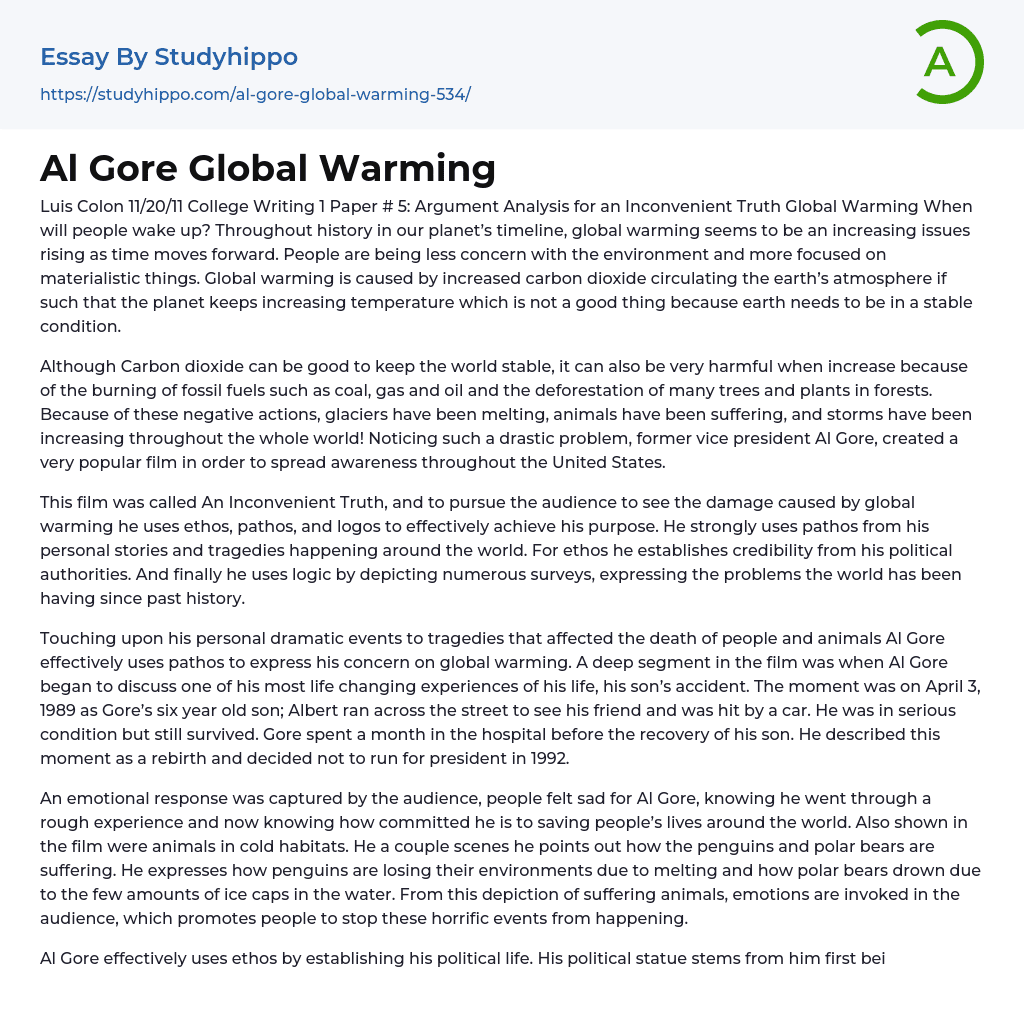Analyzing the Argument for Global Warming in "An Inconvenient Truth"
The worsening issue of global warming necessitates increased awareness and prioritization of the environment over materialism. Global warming occurs when atmospheric carbon dioxide levels rise, leading to a rise in temperatures on Earth. This instability poses harm as our planet requires stability. While carbon dioxide can be beneficial for maintaining stability, its levels become detrimental due to activities such as burning fossil fuels (coal, gas, and oil) and deforestation. These actions result in negative consequences including glacier melting, harm to animals, and a global increase in storms. Acknowledging the severity of this problem, former vice president Al Gore produced a widely-known film with the aim of raising awareness across the United States.
This film, named An Inconvenient Truth, skillfully employs ethos, pathos, and logos to convincingly convey the effects o
...f global warming. Pathos is effectively utilized by sharing personal stories and worldwide tragedies. Ethos is established through the inclusion of political authorities to bolster credibility. Additionally, logic is employed through the presentation of numerous surveys and a focus on historical challenges faced by the world.
Al Gore skillfully employs pathos to convey his distress regarding global warming, delving into personal accounts of intense events and calamities that resulted in loss of life for both humans and animals. A particularly poignant scene in the film highlights Gore's reflection on an experience that profoundly transformed his existence: the accident involving his son. Back on April 3, 1989, a heart-wrenching incident occurred when Albert, Gore's six-year-old child, dashed across the road to visit a friend but was tragically struck by a vehicle. Despite sustaining severe injuries, Albert miraculously pulled through.
Gore underwent
a month-long hospitalization while his son was recovering. This experience was likened to a rebirth for him, leading him to decide against running for president in 1992. The audience empathized with Gore's emotional response and felt sorrowful for him, having gone through such a difficult ordeal, and realizing his unwavering dedication to global life-saving efforts. Additionally, the film showcased animals residing in frigid environments.
Al Gore uses ethos to emphasize his political career, specifically through instances where he highlights the plight of penguins and polar bears. He conveys that melting ice is causing penguins to lose their habitats and the scarcity of ice caps in water results in polar bears drowning. By portraying the animals' suffering like this, he elicits powerful emotional reactions from the audience, urging them to take action and prevent these dire circumstances.
Al Gore's political career began when he was elected as a senator in Tennessee, serving for 24 years. He later became a US senator and then vice president. In an amusing introduction, he acknowledges his political status with the words, "Hello, my name is Al Gore and I was supposed to be the next president of the United States." This light-hearted statement not only reveals his political affiliation but also establishes a connection with the audience. As a result, they are more likely to trust him because they see him as an ordinary person rather than a politician seeking attention. Establishing this rapport is crucial in persuasion since it allows people to be more receptive to his arguments about global warming, knowing that he understands their viewpoint.
Additionally, reflecting on his son’s accident, Al Gore shows ethos and pathos to the viewers
as he demonstrates a greater concern for the world and its people. This display of empathy enhances his credibility. Furthermore, Al Gore establishes his political authority and discusses his son’s accident, further bolstering his credibility with the audience. Moreover, Al Gore frequently employs logic in his speeches by utilizing multiple surveys and charts as evidence to support his claims.
One of Al Gore's claims is about the issue of rising temperatures, for which he provides surveys. In this presentation, he addresses skeptics who argue against global warming by pointing out that extreme temperatures have always occurred in the past and the world has survived. However, Gore emphasizes that currently (in 2000), the temperature has risen significantly compared to medieval times. This evidence logically demonstrates that if people don't change their behavior, more heat will be trapped on Earth, leading to damage to the planet and all living things. Ultimately, Al Gore's argument shares similarities with Aldo Leopold's essay "The Ecological Conscience". Both of them highlight how individuals prioritize their self-interest over environmental conservation. Leopold illustrates this through farming practices in 1930.
The government instructed farmers to adopt certain remedial practices for five years, as the topsoil was eroding towards the sea. Materials were provided to support these practices. However, when the five-year contract ended, the farmers largely forgot about the practices, only continuing those that brought them immediate economic gain. Leopold argues that this demonstrates a prioritization of money over the welfare of the earth. Al Gore echoes this sentiment by highlighting the harm caused to wildlife in forests and other environments due to factory construction and self-interest.
By fostering global cooperation and increasing concern for our environment,
we can prevent the phenomenon of global warming.
- Animal Welfare essays
- Climate Change essays
- Conservation essays
- Global Warming essays
- Plastic essays
- Recycling essays
- Waste Management essays
- Zoo essays
- Atmosphere essays
- Biodiversity essays
- Coral Reef essays
- Desert essays
- Earth essays
- Ecosystem essays
- Forest essays
- Lake essays
- Natural Environment essays
- Ocean essays
- Oxygen essays
- Rainbow essays
- Sea essays
- Soil essays
- Volcano essays
- Water essays
- Wind essays




